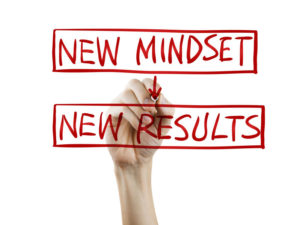Where it all Begins – Mindset for Increasing our Productivity
In the first article of this series, we began with a different perspective to the traditional goal-setting/resolution-making process – time management vs. energy management. In this article of three, we will look at the mindset attributes for increasing our energy and productivity in our work environment.

It can start with an organized space where you will be the best version of yourself—more efficient, more organized, and healthier. After all, how can you constructively improve when your inbox is overflowing, your desk is stacked with papers, your files are disorganized or non-existent and your supplies are absent or not at hand? How can you be productive when your office is piled with clutter?
“You may think that you don’t have time to organize your office, but if you really knew how much time that disorganization cost you, you’d reconsider,” says Marty Basher, home organization expert at Modular Closets. Strategies such as, rearranging and moving piles doesn’t count. Neither does clearing off your desk by moving items into a bin or a desk drawer. A relatively neat and orderly office space clears the way for higher productivity and less wasted time.” And it doesn’t have to take hours and hours, notes Basher.
Making the decision to declutter your office can feel like a huge step in and of itself, but actually getting started is a much larger obstacle. Particularly if you have a big decluttering job ahead of you, knowing where to begin the process can be overwhelming — which is why coming up with a decluttering game plan is essential. The following principles or attributes will assist with the establishment of your plan.
Mindset Attributes
- Recognize when it’s time to declutter.
“The space in which you spend your time greatly affects your wellbeing,” according to Julia Pinsky of Pinsky Project. So if you come home to a “clean” home but still aren’t able to relax, it’s probably time for some serious decluttering and organizing at work. - Your work space should be for work only.
Non-work-related items act as reminders of other responsibilities can be distracting when you need to focus on work. - Do a little at a time, like an ongoing project versus a one-time, all-day event. Start with 10-15 minutes, then stop.
- Before you dive in, figure out what your decluttering goal is. Knowing what your end goal is can help you prioritize tasks and figure out your next steps.
- Tackle a Category at a Time; Not Everything at Once. For example, deal with every single one of your books at once as one category.
- Start with what you feel is the easiest category first. For example, if you know you need to do an overhaul of your entire office, clean out a desk drawer first — it can empower and motivate you to tackle bigger decluttering projects.
- Emotional attachment is not your friend. Watch for triggers such as gifts from special people, your favorites, the old phrase – “I might need this someday!”, etc.
How ready are you?
Where will you begin?